Archives: Documents
-
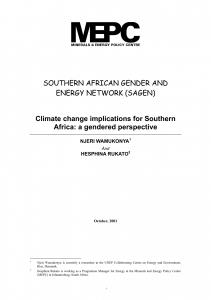
Climate Change Implications for Southern Africa: A gendered perspective
This paper explores some of the potential impacts of climate change, possible adaptation strategies, and whether or not, given the socio-economic and political situation of the region, progress can be made towards ensuring that the region survives climate change. The paper highlights critical issues in international policies and strategies and their implications for the Southern…
-
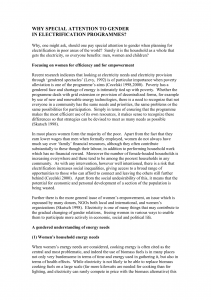
Why Special Attention to Gender in Electrification Programmes?
This paper sets out to say that women’s priority energy needs are different from men’s. There is little information or written experience, however, on how to deal with this in the practice of setting up and running electrification programmes. The report presents four steps that should be taken to take gender differences explicitly into account.
-
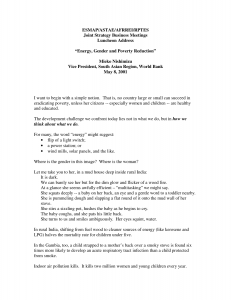
Energy, Gender and Poverty Reduction
Mieko begins with the following notion – that no country large or small can succeed in eradicating poverty, unless her citizens (especially women and children) are healthy and educated. The development challenge we confront today lies not in what we do, but in how we think about what we do. For many, the word energy…
-
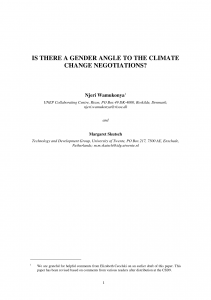
Is There a Gender Angle to the Climate Change Negotiations?
This paper attempts to establish whether gender issues need to be addressed in the climate change debate. Towards this goal, a number of different issues within the climate change debate, in particular the instruments proposed are analysed. While there are many gender angles related to the climate change convention and the instruments therein, some are…
-
Gender Perspectives on Energy for CSD-9
This paper sets out the reasons, both from a Southern and from a Northern perspective, why gender issues need to be more strongly integrated into energy policies, planning and projects, to increase sustainable energy access for women. It refers to relevant recommendations made at UN meetings and other expert gatherings and lists a number of…
-
Integrating Household Energy into Rural Development Programme
Despite urbanisation, most people in developing countries still live in rural areas and will continue to do so for the foreseeable future. Agricultural production is the basis of rural economies, but other rural industries such as fish smoking, beer brewing, production of simple agricultural tools, and tea and coffee drying also provide essential livelihoods in…
-
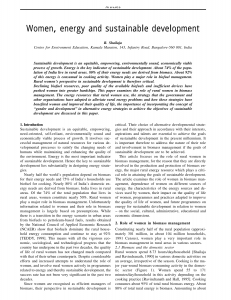
Women, Energy and Sustainable Development
Sustainable development is an equitable, empowering, environmentally sound, economically viable process of growth. Energy is the key indicator of sustainable development. About 74% of the population of India live in rural areas. 80% of their energy needs are derived from biomass. About 92% of this energy is consumed in cooking activity. Women play a major…

